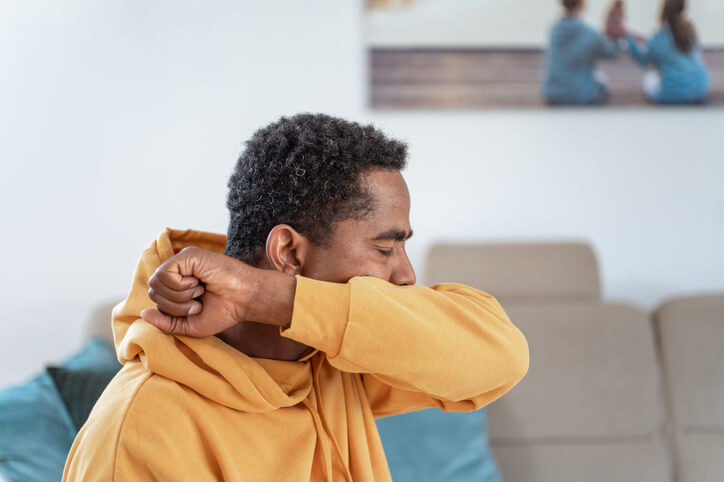
A guide to tickly coughs
Having a cough or sore throat is no fun, and it can be even worse if you don’t know what type of cough you have. Treatments for chesty coughs can differ from tickly coughs – and they can be caused by different things, too[1]. If you think you might have a tickly cough, keep reading to learn more about its symptoms, causes and potential treatments.
What is a tickly cough?
A dry tickly cough is where an itchy, irritated feeling in your throat causes you to cough reflexively. It’s sometimes called an ‘unproductive’ cough because there isn’t any phlegm in your airways to shift. This is what makes it different to a chesty cough, which does produce phlegm.
Typically, a tickly or dry cough shouldn’t last more than three weeks. If it does, or if your cough is particularly severe, you should speak to a doctor or pharmacist. You should seek urgent medical help if you cough up blood or if you experience shortness of breath or chest pain as a result of your cough[1].
What causes a tickly cough?
Since a tickly cough is caused by irritation in the throat, there are lots of environmental and medical factors that may cause it. These include[1]:
- Infections of the upper respiratory tract – such as a cold, flu, sinusitis, laryngitis or whooping cough
- Infections of the lower respiratory tract – such as acute bronchitis or pneumonia
- Dry atmosphere
- Not drinking enough fluids
- Pollution
- Inhaling dust or smoke
- Allergies such as rhinitis or hay fever
- Long term conditions flaring up – such as asthma, chronic bronchitis or chronic obstructive pulmonary disease (COPD)
How to get rid of a dry tickly cough
Typically, a tickly cough should get better in a few weeks. This is because most of the potential causes are short term – for example a cold or flu infection. However, you may find the cough impacts your day to day activities. Here are some of the methods you can use to try and ease your tickly cough[1]:
- Hydrate yourself
A tickly, irritated throat can be caused by something as simple as not having had enough to drink. When you’ve got a sore throat or cough, your first port of call with cough symptoms should be to drink a glass of water. You may find that all you needed to ease your symptoms was enough fluid to ease friction in your throat[1].
- Hydrate your atmosphere
If you think your tickly cough may be caused by dry air, you might benefit from adding moisture to the air at home. Of course, you don’t need to turn your living space into a humid rainforest, but you should aim for a balanced climate. Reducing the dryness of the air can ease the irritation in your throat and may reduce cough symptoms[1].
- Banish your allergies
Although we often think about hay fever’s sniffles, sneezes and itchy eyes, it can also cause sore throats and coughs. Hay fever is irritation caused by pollen getting into your eyes, nose and throat and triggering an immune response. Taking hay fever medication to prevent that immune response may reduce your symptoms of coughs and sore throats[2].
- Treat the symptoms rather than the cause
It can be hard to pinpoint exactly what is causing your tickly cough, especially when all you want is for it to be over. Regardless of whether your cough is caused by flu, asthma, pollution or something else, easing the cough can help you to get on with your day.
One way of doing this is to take an over the counter cough medicine. Chloralieve’s soothing throat lozenges contain honey and lemon and are designed to ease coughs and sore throat symptoms. You could also try making a hot honey and lemon drink to boost the results – as well as having a tasty beverage![3,4]
Resources:
[1] https://www.nhs.uk/conditions/cough/
[2] https://www.nhs.uk/conditions/hay-fever/
[4] https://www.sciencedirect.com/science/article/pii/S2590207520300010#sec3
